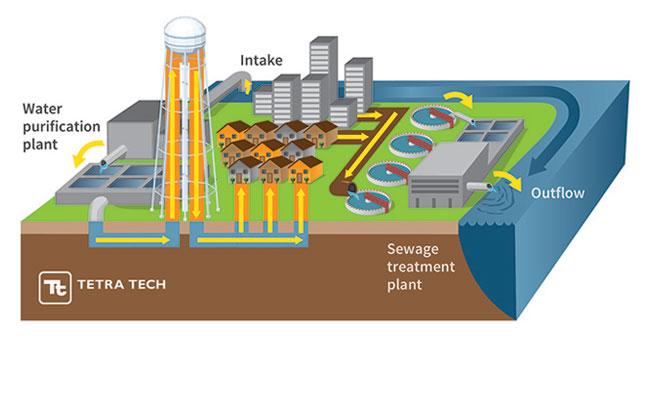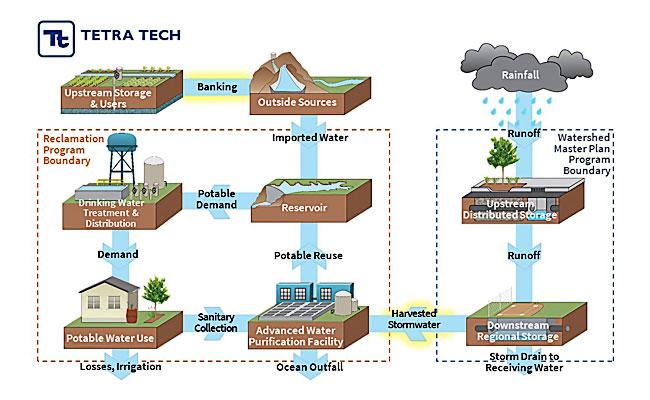Expanding the Vision for Funding Water Projects
Refining the national approach to funding water infrastructure projects
Water Connections: Linking water management to sustainable and resilient commun…
Trevor Clements, Tetra Tech’s Mid Atlantic regional manager for Integrated Water Management, spoke to the North Carolina State Water Infrastructure Authority, the independent body with primary responsibility for awarding both federal and state funding, on the topic of One Water and its relationship to infrastructure funding on December 13, 2017. In this post, he shares his perspective on how communities can make the best use of limited water infrastructure funding. All opinions expressed in this post are the author’s own.
“One Water” embraces the idea that all water is valuable and that we can optimize management of these resources (e.g., surface water, ground water, stormwater, wastewater) to support the vision of community resilience and a balanced triple bottom line of prosperous economy, high-quality of life for all, and a healthy environment for future generations. On February 7, 2018, the U.S. Water Alliance is hosting its third webinar in a series of seven presentations regarding big ideas for implementing a One Water approach, this one titled “Sustain Adequate Funding for Water Infrastructure.” While adequate investment in our water infrastructure definitely is a national goal, I would add that another priority is to refine our approach for how we spend that money.
The American Society of Civil Engineers (ASCE) in its 2017 Infrastructure Report Card estimates 1 trillion dollars are needed nationwide over the next 25 years to address the growing water infrastructure deficit. When the Clean Water and Safe Drinking Water Acts were first adopted, large investments went into construction grants that many communities used to build large, centralized systems to meet water supply and wastewater treatment needs separately. Given today’s high capital cost for pipes, pumps, and treatment systems that consume energy and have high maintenance and replacement costs, many water-related agencies now are focusing on how to best invest their limited water infrastructure funds. Smart master planning can combine asset management, risk management, and resiliency frameworks to develop a robust, prioritized capital improvement plan. Many agencies are turning to integrated water resource planning and One Water approaches that consider drinking water, wastewater, stormwater, and reclaimed water together.
Future water supply strategies historically have focused on identifying the next‐available, highest quality water supply source. However, recent paradigm shifts in water supply have moved the focus to sustainable communities, and therefore to identifying the next, most local, and sustainable water supply source. Communities have room to expand upon traditional approaches to water demand management and water loss prevention. Additional approaches can include stormwater capture and reuse and wastewater reclamation and recycling, so that water is used through multiple cycles at its greatest good—and therefore is conserved and not lost. One Water concepts that integrate stormwater and reclaimed wastewater as resources also can extend the life of potable raw water supplies by saving them for truly potable needs. Removing stormwater and wastewater volumes that otherwise would have been discharged to streams or other natural waterways can reduce water pollution.
What I find very exciting under a One Water paradigm is that we are considering a much broader array of options that provide multiple benefits to communities that must invest in and manage their water infrastructure. For example, in regions where infrastructure is being expanded to support growth, we could decrease asset management costs by co-locating stormwater capture and wastewater recovery systems with potable supply. We are seeing multiple examples of this now in places such as Southern California, Arizona, and Florida.
Others communities like Olympia, Washington, are implementing smaller, more decentralized (or satellite) systems closer to where the demand exists. This go-as-you-grow method decreases the amount of time until communities can use the infrastructure at full capacity. From a resilience perspective, this approach will be seen as advantageous if we can decrease piping, pumping, and energy costs by providing local water while also reducing vulnerability to climate events that can cripple a local economy if a region’s single centralized facility is put out of service, as we have witnessed in the aftermath of multiple hurricanes and flooding events (i.e., risk reduction).
Solutions for addressing existing water infrastructure systems certainly are complex, and we have an opportunity to find innovative solutions that are not isolated to the approaches of the past. Tying our water infrastructure planning, management, and funding decisions to broader community objectives can increase public support for adequately funding water infrastructure and reconnecting communities to the value of water in our everyday lives. My next post will detail how some communities in North Carolina are undertaking efforts to facilitate more integrated water management by applying a holistic, One Water management framework.
"NC DEQ’s Division of Water Infrastructure notes that Mr. Clements' presentation of the One Water concepts of the value of wastewater and stormwater as key resources, its explanations of the problems with unsustainable business models, its attention to the concept of the triple bottom line, and its focus on the importance of leadership by local elected officials reflect many of the same issues currently on the chosen work agendas of the division and the North Carolina State Water Infrastructure Authority. The One Water concepts reinforce the critical themes under examination by the authority, and confirm their alignment with the primary focus areas of the water community at large." —Francine Durso, PE, DWI staff liaison for the State Water Infrastructure Authority



